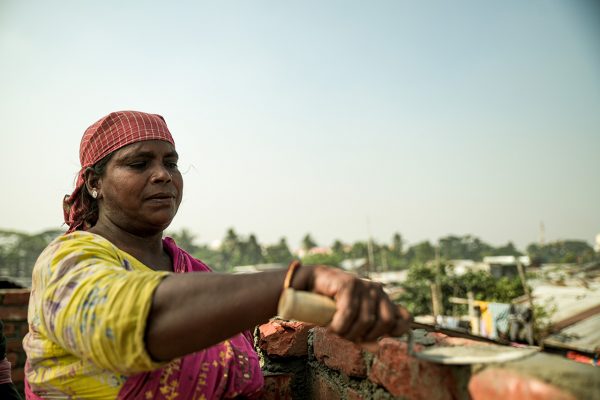Reading Time: 2 minutes
Brishty Akhter, 18, is a skilled tailor who owns a business where she trains and employs other girls in southern Bangladesh. She started learning tailoring at 16 and then her parents used the money that they had saved for her marriage to buy her the business.

Brishty Akhter, 18, is a skilled tailor who owns a business where she trains and employs other girls in southern Bangladesh. She started learning tailoring at 16 and then her parents used the money that they had saved for her marriage to buy her the business.
Brishty is a graduate of BRAC’s skills training for advancing resources (STAR) project, which is innovating upon the age-old practice of apprenticeships through keeping training based in small businesses and delivered in a hands-on way by ustads (master) craftspeople, but in a much quicker, more structured manner, and combined with literacy, numeracy and life skills.
The project is making changes at scale to Bangladesh’s skills landscape. To date, it has seen over 20,800 apprentices graduate. 95% of graduates are employed after just six months of training and their income increases by 8 times.
Every year, the Financial Times and IFC of The World Bank Group, recognise champion organisations and global initiatives bringing groundbreaking, commercially-viable solutions to current development challenges.

From left to right: Kelly Widelska, Global Head of Knowledge and Learning, IFC; Lewis Temple, CEO, BRAC UK; representative from Edukasyon.ph Employment Platform, Philippines; Joydeep Sinha Roy, Senior Manager, BRAC; Chris Locke, Founder, Caribou Digital; Ravi Mattu, Technology Editor, Financial Times.
This year, STAR received special commendation in the Financial Times/International Finance Corporation Transformational Business Award in London. STAR was the only project by a non-government organisation to be recognised in the awards.
Skills training is crucial for Bangladesh, a country where 60% of the total labour force is under 30 years old and two million young people enter the labour market every year. Half of the population are illiterate or semi-literate, and most young people end up with irregular, informal jobs.
STAR is bringing high-quality training to people from all backgrounds, and linking graduates with decent work opportunities that respect the rights of workers.
The STAR model is one that is not only crucial for Bangladesh`s skills sector, but was highlighted because it could actually be used in many other countries. The project directly addresses some of the most urgent issues in education and skills globally, discussed at the awards conference.
Current global unemployment and underemployment statistics both point to the importance of skills training. The issue of gender parity in economic development was highlighted at the conference as an immediate call for action, since women participation in the labour market is still not significant in many sectors. STAR ensures that 57% of its apprentices are young women like Brishty and that 15% of its overall graduates are trained in trades like mobile phone repairing, ICT or refrigeration and air conditioning servicing- sectors that are traditionally reserved for men. In a region with the lowest gender parity in the world, these women are working the same hours and employed in the same sectors as men.
The involvement of the private sector in skills training was also emphasised. Training providers are advised to explore partnership opportunities with private industries in collaborative financing; designing courses and ensuring sustained employment opportunities for young people.
At a time when the whole world is tackling challenges to improve women participation in the labour market, STAR has been quietly unlocking the potential of thousands of girls here in Bangladesh. The international recognition only proves that this unique apprenticeship model can have equal impact in other countries. The last five years have been a remarkable journey for me. I saw young women like Brishty come out of their societal barriers to become entrepreneurs and grow in their own fields, in their own ways.
Joydeep Sinha Roy is a senior manager at BRAC’s skills development programme.





